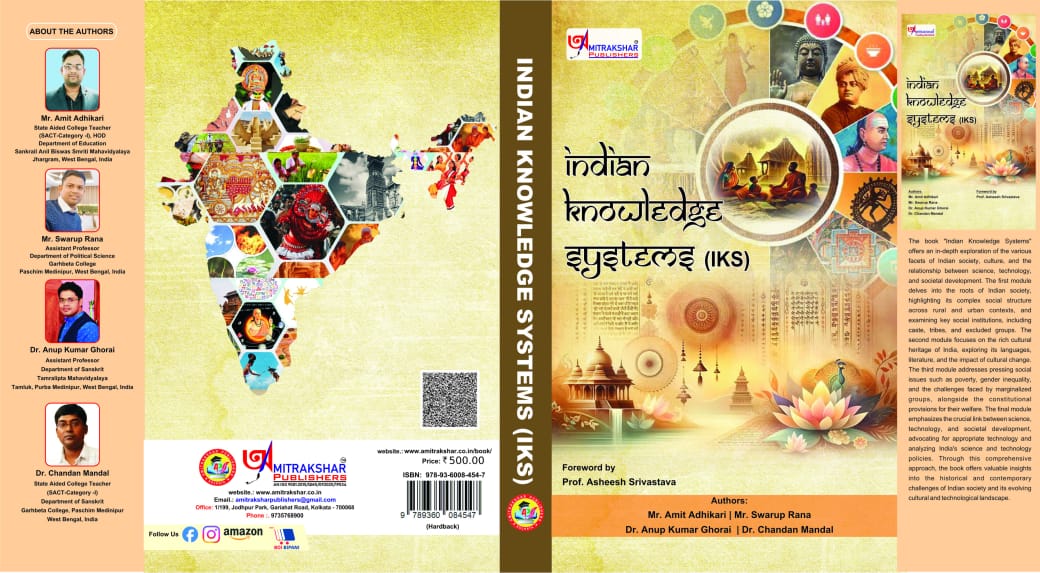Indian Knowledge Systems (IKS)
Indian Knowledge Systems (IKS)
Authors:
Mr. Amit Adhikari
State Aided College Teacher (SACT-Category -I), HOD, Department of Education, Sankrail Anil Biswas Smriti Mahavidyalaya, Jhargram, West Bengal, India
Swarup Rana
Assistant Professor, Department of Political Science, Garhbeta College, Paschim Medinipur, West Bengal, India
Dr. Anup Kumar Ghorai
Assistant Professor, Department of Sanskrit, Tamralipta Mahavidyalaya, Tamluk, Purba Medinipur, West Bengal, India
Dr. Chandan Mandal
State Aided College Teacher, (SACT-Category -I), Department of Sanskrit, Garhbeta College, Paschim Medimipur, West Bengal, India
Contents
Foreward ------------------------------------------ v
Preface ---------------------------------------------vii
Acknowledgement ----------------------------ix
Module I : Introduction to Indian Society -------------------------- 1-25
1. Roots of Indian Society
1.1 Historical Background
1.2 Cultural Diversity
1.3 Colonial Legacy
2. Social Structure – Rural and Urban Contexts
2.1 Rural Social Structure
2.2 Urban Social Structure
2.3 Rural-Urban Linkages
3. Social Institutions in Indian Society
3.1 Family
3.2 Marriage
3.4 Education
3.5 Economy
4. Caste, Tribe, Dalits, and Other Excluded Groups
4.1 Caste System
4.2 Tribes
4.3 Dalits
4.4 Other Excluded Groups
5. Power and Conflicts
5.1 Power Dynamics
5.2 Conflicts in Indian Society
5.3 Movements and Protests
Module II : Introduction to Culture in Indian Society -------- 26-45
1. Basic Understanding of Culture in India
1.1 Definition and Characteristics of Culture
1.2 Historical Evolution of Indian Culture
1.3 Key Features of Indian Culture
2. Languages and Literature in India
2.1 Languages in India
2.2 Indian Literature
3. Culture Change and Its Impact on Indian Society
3.1 Impact of Cultural Change
Module III : Social Issues in Modern India ----------------------- 46-79
1. Poverty – Multidimensional Aspects
1.1 Definition and Measurement of Poverty
2. Gender Issues in Development
2.1 Gender Disparities in India
2.2 Empowerment and Rights of Women
2.3 Initiatives for Gender Equality:
2.4 Role of Women in Development
3. Constitution of India: Overview and Relevance to
Social Issues
3.1 Fundamental Rights and Directive Principles
3.2 Reservation Policies:
4. Slums: Causes, Consequences, and Interventions
4.1 Causes of Urban Slums
4.2 Problems Faced by Slum Dwellers:
4.3 Government and NGO Initiatives:
5. Informal Sector: Issues and Challenges
5.1 Characteristics of the Informal Sector
5.2 Contribution to Economy
5.3 Challenges
5.4 Reforms and Initiatives
6. Children and Physically Challenged: Rights and
Issues
6.1 Children: Rights and Issues
6.2 Laws and Policies:
6.3 Government Initiatives
6.4 Physically Challenged: Problems Faced
6.5 Laws and Schemes
Module IV: Science, Technology, and Society ---------------- 80-98
1. Appropriate Technology
1.1 Definition and Concept:
1.2 Principles of Appropriate Technology:
1.3 Applications in Agriculture, Healthcare, and Energy:
1.4 Challenges in Implementation
2. Science, Technology, and Development Linkage
2.1 Understanding the Linkage:
2.3 Role in Sustainable Development
2.4 Impact on Societal Transformation
3. Science and Technology Policy
3.1 National and International Perspectives
3.2 Objectives of S&T Policies
3.3 Policy Framework
3.4 Challenges in Policy Implementation
3.5 Future Directions

